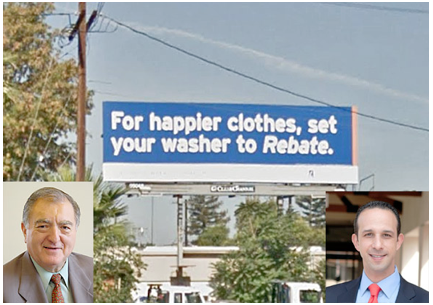CommentsBILLBOARD WATCH-What a difference a dozen years makes. Back in 2002, LA City Councilmember Hal Bernson called for the removal of an unpermitted billboard in his San Fernando Valley district and the prosecution of its owner. But in 2014, Councilmember Mitchell Englander, who now represents that district, called for granting “amnesty” to that billboard and almost 1,000 others the city has identified as either lacking permits or having been altered in violation of their permits.
At the same time, Bernson urged a legal challenge to a state law that puts the burden on the city to prove that unpermitted and altered billboards like the one in his district were erected unlawfully if they hadn’t been cited within five years. He told an LA Times reporter that the law was “horse manure” and said, “We have to test it. Otherwise we have no enforcement authority.”
The city never challenged the 1983 statute, widely regarded as a billboard industry privilege that no other kind of business in the state enjoys. Englander cited the law as a reason to grant billboard amnesty, predicting that the city would be drawn into ruinous litigation if it pursued action against unpermitted and altered billboards.
Bernson’s call for legal action came after he asked city officials to check a random sample of billboards in his district, which includes the communities of Chatsworth, Granada Hills, Northridge, and Reseda, among others. The partial survey found three unpermitted billboards and six that didn’t match the specifications of their permits.
Two of the unpermitted billboards are still standing and displaying ad copy and the third is currently shown as permitted by the city’s Department of Building and Safety. Five of the six altered billboards are also standing. One has an unpermitted second face, while several are higher or larger than specified in their permits.A citywide billboard inventory and inspection showed that Englander’s district has a total of 149 billboards, which is by far the lowest of any of the city’s 15 council districts. Of those, 15 lack permits and 11 have unpermitted alterations, according to inventory data made public nine months prior to Englander’s amnesty proposal.
The City Council’s PLUM committee, of which Englander is a member, added the amnesty provision to a new citywide sign ordinance that has been in the works since 2009, but on October of last year the City Planning Commission emphatically rejected the idea and questioned why the city hadn’t been taking enforcement action against the billboards known to be in violation of the law.
The PLUM committee okayed the amnesty shortly after receiving a letter from City Attorney Mike Feuer saying that enforcement action could be successfully taken against many of the billboards despite the state law colorfully characterized by Bernson in the LA Times article. Feuer told committee members that his office was ready to help in any enforcement effort.
The City Council could reject the planning commission’s action and reinstate the amnesty provision, but that would take a supermajority of 10 votes. Four councilmembers -- Mike Bonin, Paul Koretz, Paul Krekorian, and David Ryu -- have publicly stated their opposition to billboard amnesty. A fifth, Mitch O’Farrell, has said that he was pleased by the commission’s action, which also included a rejection of another PLUM committee proposal -- to allow digital billboards outside special sign districts.
Bernson retired from the City Council in 2003 after 24 years in that office. He was succeeded by Greig Smith, who was succeeded by Englander in 2011. Englander is currently a candidate for the LA County Board of Supervisors in this year’s June primary election, and has received significant support from billboard companies and their employees as well as lobbyists representing major billboard companies.
Interestingly, Bernson’s unsuccessful attempt in 2002 to get the city to challenge the state law seen as protecting illegal billboards came on the heels on a City Attorney race that many believe was heavily influenced by free billboard advertising for the winner, Rocky Delgadillo. (photo)
So it’s not surprising that Delgadillo never gave his blessing to Bernson’s call for the removal of the unpermitted billboard, the prosecution of the owner, and the challenge to the state law. Is also not surprising that Mike Feuer’s office opposes Englander’s billboard amnesty, since he was the loser in that campaign that featured Delgadillo’s name on billboards around the city in the days leading up to the election.
(Dennis Hathaway is the president of the Ban Billboard Blight Coalition and a CityWatch contributor. He can be reached at: [email protected].)
-cw
CityWatch
Vol 14 Issue 7
Pub: Jan 22, 2016
Explore
Our mission is to promote and facilitate civic engagement and neighborhood empowerment, and to hold area government and its politicians accountable.

 CityWatch Los Angeles
Politics. Perspective. Participation.
CityWatch Los Angeles
Politics. Perspective. Participation.
22
Tue, Apr















